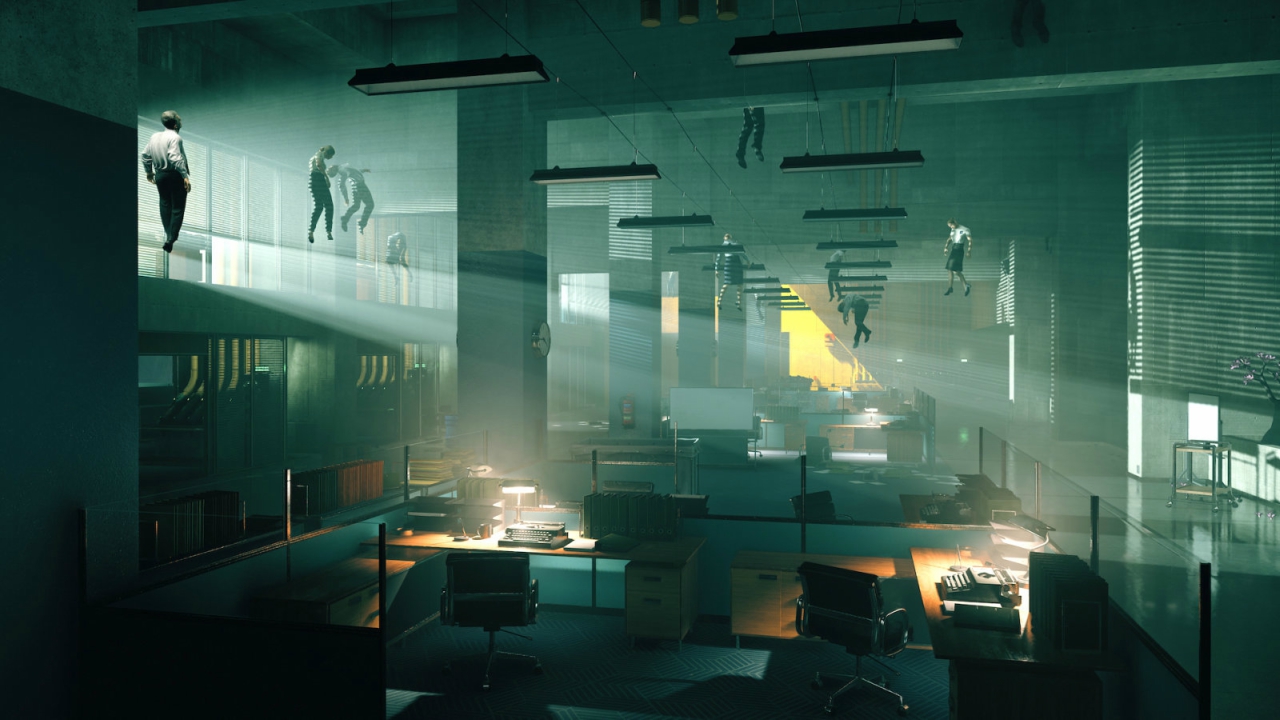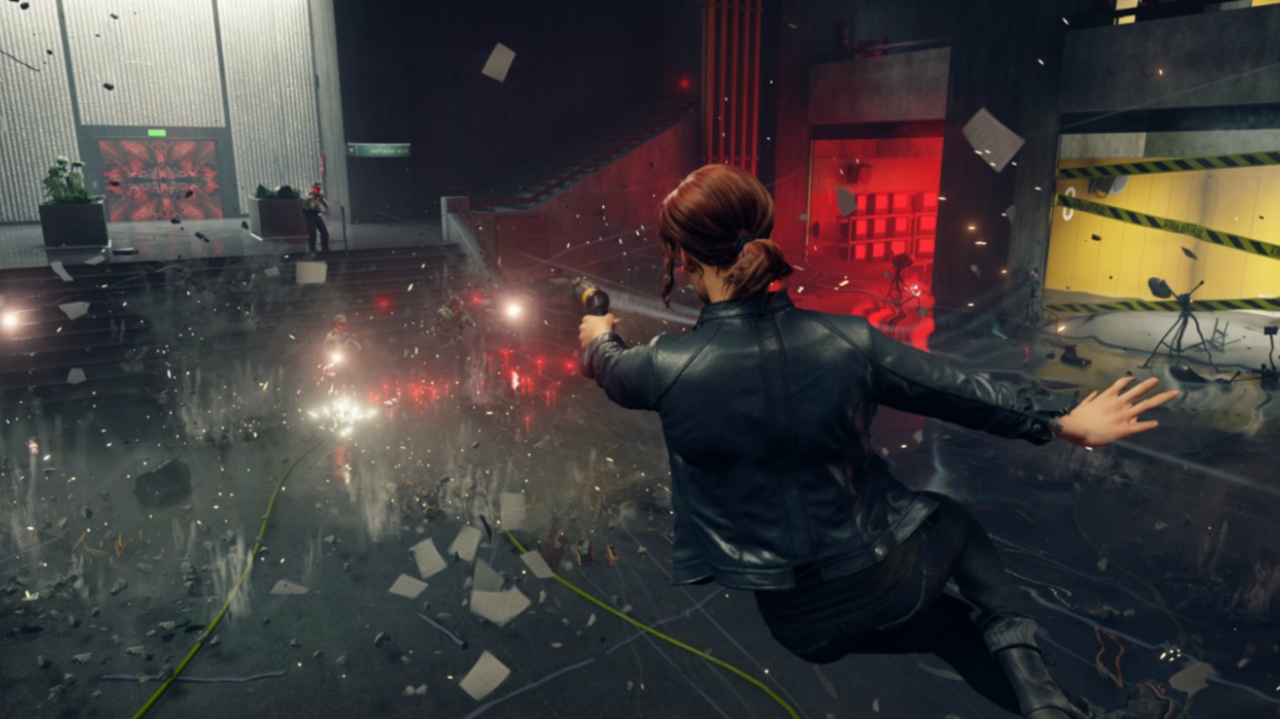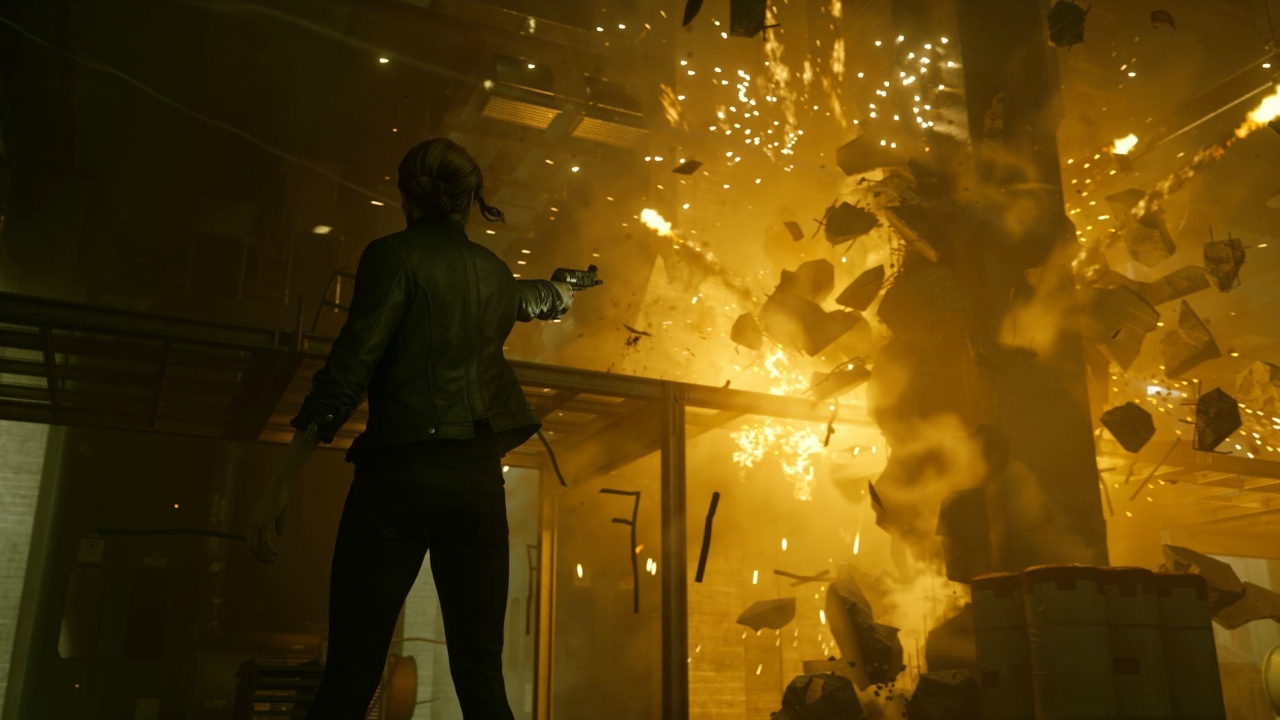Control review
A “cold open”, for anyone not familiar with the term, is a narrative technique whereby a show, play or film jumps directly into the story with no context or title sequence. It’s used a lot in procedural crime shows and mysteries as a way to put the audience on the back foot from the start and remove any sense of comfort or familiarity.
The opening of Control, from Alan Wake and Quantum Break developer Remedy Entertainment, should come with an iceberg warning. It doesn’t so much put you on the back foot as it firmly sits you on your arse, and the narrative style comes dangerously close to trading paint with an almost Quantic Dream level of self-satisfaction. For most of the first hour or so, I felt like I’d wandered into a cinema half way through a film and any question I asked was met with a sneering hush from the ass-hat in front, whose head blocked half the view and who’s popcorn drowned out half the dialogue.
TL;DR: Control is incredibly obtuse, at least to begin with. It seems to exist in a world analogous to our own but which is fictional nonetheless, where an organisation called the Federal Bureau of Control catalogs and monitors anomalies in the fabric of reality called Altered World Events, or AWEs, and the Objects of Power they sometimes create. If you’ve ever delved into the SCP Foundation archives online and read some of the imaginative, original or downright creepy “case files” there, you’ll see definite parallels between the SCP and the FBC.

Your character, Jesse Fadan, arrives at the FBC headquarters, known as The Oldest House, to take over as the new Director amidst an internal security lockdown which she is somehow allowed to breach. Finding that her predecessor has recently met a gruesome end and an otherworldly entity that Jesse calls “the Hiss” is in control of many of the Bureau’s systems and personnel, Jesse teams up with a handful of survivors to investigate the crisis as it unfolds. A lot of this involves freeing key areas from Hiss control such as the Oldest House’s power plant and ventilation system.
The aforementioned Objects of Power are central to the plot. Essentially they’re mundane items that have been imbued with reality-changing properties, properties which Jesse – for reasons the story takes a painfully long time to divulge – can absorb and use. For example, the Service Weapon is a firearm wielded by the Director that can change forms from pistol to shotgun to machine gun and more, but which can also be used as a key to activate certain machines and devices within the Oldest House.
Other Objects of Power include a floppy disc that allows Jesse to launch projectiles with telekinesis, or a safe that imbues her with the power to create shields from whirling debris. In fact it’s these powers that elevate the combat in Control to something bordering on amazing. Mixing gunplay with paranormal powers is nothing new, but Control leans so heavily into the latter that combat develops an addictive rhythm and a sense of almost over-empowerment, especially when you reach the halfway point and you’ve developed Jesse’s gifts to a certain strength.

Unlocking each power requires Jesse to “cleanse” the OoP, often by solving a rudimentary puzzle of some kind or, in one instance, completing a Field Test obstacle course. Most of the puzzles involve launching charged batteries into power nodes or variations of, and the powers themselves are imbued in a blocky alternate reality that resembles a VR training suite. Control is that kind of weird. In actual fact it’s incredibly, deliberately, videogame-y. The otherworldly entities that seem to control the FBC, known only as The Board, speak like emotionless game developers and refer to most objects and people with two denominations like they’re reading code. It’s hard to just shut up and accept that Jesse has powers, but you have no choice – something especially irritating when you’re opening pressure-sealed containers that disgorge canisters containing weapon or personal mods and you just go into a menu and install them. I mean, just where in the name of Alan Wake is Jesse installing these things? Nothing is organic, nothing is given context. You just do it. Maybe it’s intended to be thematic of Jesse not being fully in control of her actions, but it’s still annoying to upgrade your “Energy” when you don’t know where the hell this Energy comes from, what it does or why you have it.
Perhaps the biggest initial hurdle to get over in Control is Jesse herself. As the game begins she’s remarkably cold and distant, and it takes some considerable time for her to open up and become anything other than a blank cipher with unexplained powers. Her central mystery, revolving around the disappearance of her brother Dylan, takes the full game to unfold fully, and for a lot of the time you’ll be left guessing. That, I don’t mind. What I mind is that Control initially makes it very hard to care about Jesse, Dylan, or anything else that’s going on.

Somewhat ironically, it’s the straight-up action that carries you through. For a narrative-focused mystery, Control is heavy on the gunfights and Jesse’s repertoire of abilities and upgrades makes her a formidable opponent for the Hiss and its mind-controlled minions. Mixing gunplay and telekinesis, shields and mid-air dashes, picking up weakened enemies and hurling them through the air… These things all feel incredibly cool. It borrows the loose contextual cover mechanic from Quantum Break, which allows Jesse to pop up from whatever she’s crouched behind without actually snapping into a cover position. When bullets are punching chunks of debris from the wall, you’re hurling explosive canisters at enemy troops, and the semi-destructible environments are coming apart in fountains of sparks, gouts of flame, blinding flashes and sprays of mortar, it rivals any other third person shooter for sheer adrenalised spectacle.
Elsewhere, though, it’s not always the prettiest game. The environments are detailed enough, though it reuses a lot of assets fairly shamelessly. You’ll see the same few pictures of two guys hunting over and over, desks have the same clutter on them office to office, and the decor is pretty much the same throughout. Whenever the Hiss has control of an area, through, the red light that dominates the rooms and corridors is wonderfully unsettling. When you take a Control Point back from the Hiss, normal lighting returns as reality reasserts itself and reconfigures the surrounding area. It’s satisfying to watch every time.
Unfortunately, character models are very inconsistent, too. Jesse and the creepy janitor Ahti (who let her in through the lockdown for reasons of his own) look spectacular in cutscenes, but supporting characters can look almost inhuman. Their textures are muddier, their features much less detailed. It’s not a major issue, but it is noticeable. What is a major issue is the frame rate, which really plummets during bigger fights when there are particle effects and batshit lighting and explosions all around. It also struggles to handle its own map, which sometimes comes up minus any rooms or corridors, and always causes the frame rate to chug a little slower.

By this point, games from Remedy Entertainment more or less occupy their own subgenre. Since the days of Max Payne (the first two, not the Rockstar one) they’ve always mixed the extraordinary with the ordinary, the supernatural with the mundane, to create unsettling worlds where you can take nothing at face value. Control is the same, but more so, fully embracing its sci-fi chiller elements to deliver one of the most intriguing worlds I’ve visited in a long time. It’s a world that rewards Easter egg-hunters, connecting to Remedy’s previous works in sometimes surprising ways. Whether they’re building a universe or paying fan service is hard to tell for sure, but before you know it you’re scanning every collectible you find in the hope of another little easter egg high.
Control is a weird one. Some will struggle to connect with its protagonist and her plight, which Remedy somewhat successfully attempt to mitigate by throwing you in the deep-end of the action and shouting at you to swim. It mostly comes off, too, but there are some things I just can’t ignore. Not only the technical issues or the iffy reuse of visual assets, but the unabashed gamey-ness of it all. At least in Quantum Break Jack Joyce came into his powers gradually and we learned about them with him, and in Alan Wake we could put ourselves in Alan’s everyman shoes and tremble quietly in the dark with him. Jesse can just fuck shit up almost right from the start and we don’t get to learn why until way, way later. We’re told to shut up and accept it, because we can’t find answers to our questions, only to Jesse’s, and she’s not asking the same ones we are at any point in the game.
The combat is fun, and the story (once it opens up) is very interesting, but despite it being a well-made shooter in a well-realised world, Control knows it’s much smarter than you and rarely lets you forget it. Compelling, exciting, creepy but obtuse, your ability to fully enjoy Control depends on your willingness to simply surrender you own, and accept what is. You’ll get your answers when Remedy decide it’s time.




